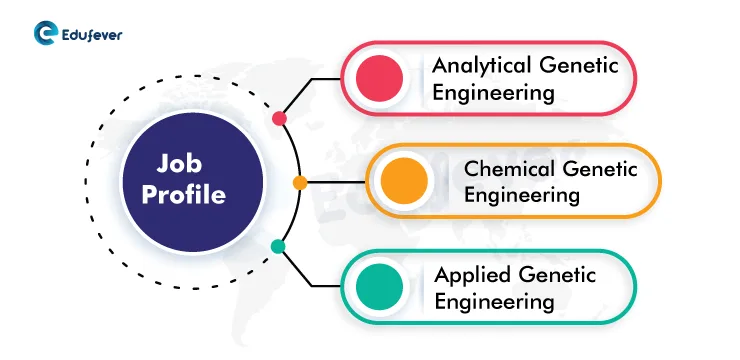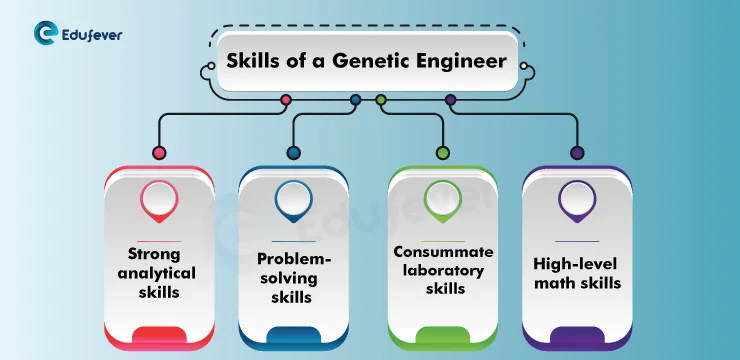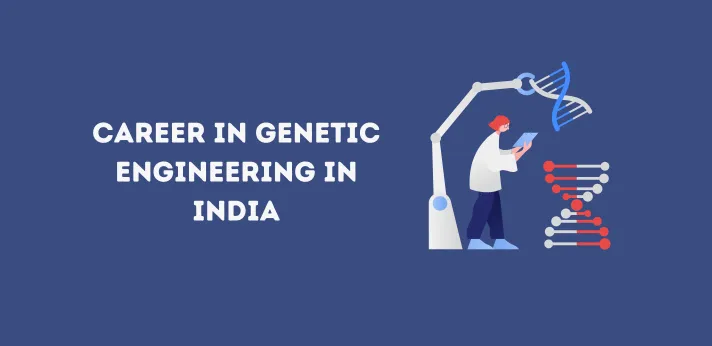Career in Genetic Engineering in India: The Genome is responsible for the characteristics and behavior of every living organism. Modification in DNA with desirable traits to organisms lacking them, a genetic engineer can enhance their qualities. This article provides complete insights into genetic engineering careers in India, providing various job opportunities after completing genetic engineering courses.
Genetic Engineering is an application of Biotechnology and it involves studying and modifying of genome, also known as Genetic Modification. Nowadays, Genetic Engineering focuses more on plants than humans.
[Index]
What is Genetic Engineering?
Genetic engineering, also known genetics modification. It is an important discipline of science that deals with the manipulation of genomes of living organisms. The utmost thing that requires doing Genetic Engineering is recombinant DNA, a combination of DNAs from different organisms. Each gene structure represents a particular quality, and hence this process of manually removing genes and modifying and inserting it into an organism to have the quality represented by the gene added to the organism. The organism undergoing modifications is known as a host organism, and the host organism may vary from single bacteria to plants or animals or even a human cell.
Course Highlight
This table offers an overview of Genetic Engineering Courses.
| Particulars | Description |
|---|---|
| Course Name | Bachelor of Technology or Engineering (B.Tech. / B.E) Master of Technology (M.Tech.) Bachelor of Science (B.Sc.) Master of Science (M.Sc.) Certificate Courses in Genetic Engineering Master of Philosophy (M.Phil.) in Genetic Engineering Doctor of Philosophy (PhD) / in Genetic Engineering Post Graduate Diploma in Genetic Engineering |
| Duration | UG: 4 Years PG: 2 Years PhD: 3 Years |
| Types of Genetic Engineer | Analytical Genetic Engineering, Chemical Genetic Engineering, Applied Genetic Engineering |
Admission Procedure
- If you want to become a genetic Engineer, first you need to clear a state or national-level entrance exam.
- The candidates can also appear for the entrance exams conducted by deemed universities like JEE, GATE, BITSAT etc.
- The admission is based on the marks obtained by the candidates in the entrance test.
- Private colleges do consider direct admission in B.Tech courses through Class 12th merit.
Eligibility Criteria
The following are the eligibility criteria for genetic engineering:
| Particulars | Descriptions |
|---|---|
| Qualification | The candidates must have passed Class 12th with Physics, Chemistry, Biology or Physics, Chemistry, and Mathematics. |
| Qualifying Marks | Candidates must have a minimum of 50% marks. |
Top College in India Offering Genetics Engineering
There are many colleges in India offering Genetics Engineering courses. Some of the top colleges are mentioned below:
| College Name | Location |
|---|---|
| NIT Surathkal | Karnataka |
| Indian Institute of Technology | Haus Khas (Delhi) |
| Haryana Agricultural University | Hissar |
| Centre for Biotechnology | Pondicherry |
| Jawaharlal Nehru University | New Delhi |
Career in Genetic Engineering
Genetic Engineering is a research-oriented field; hence, the job vacancies for genetic research engineers are very high. Genetic Engineers with sufficient education and experience can easily grab a teaching position at universities and colleges. There is a section called Research and Development for Genetic Engineers in the Biotech and Pharma industries.
A genetic engineer can work as a lab assistant, research associate, junior researcher, research engineer, or lab manager, lead a team of researchers, or even start their research at home or in labs.
Job Offered
Below we have mentioned some of the jobs offered to a Genetic Engineer. Have a look at the job profile and their responsibility:
| Job Profile | Description |
|---|---|
| Analytical Genetic Engineering | This field uses computers to model or simulate genetic changes before producing the genetic material in real life. This is also known as in silico genetic modification, as it occurs within a computer’s silicon, following the same naming conventions as meaning in glass and the living body. |
| Chemical Genetic Engineering | Chemical genetic engineering focuses on identifying, separating, and classifying different genes to provide sufficient information for their use in applied genetic engineering. |
| Applied Genetic Engineering | This field puts genetic engineering to practical use, actually manipulating an organism’s genetic material via genetic engineering techniques, modifying their phenotype to exhibit traits that we desire. |
| Biotechnologist | This field uses genetic engineering principles to develop new products and technologies in fields like medicine, agriculture, and industry. They may work on creating biofuels, genetically modified crops, or gene therapies. |

Roles of a Genetic Engineer
The roles of a Genetics Engineer is very critical in manipulating the structure of DNA. They do research, design and analysis with a goal of creating organisms with specific desired traits. Here’s a breakdown of their key roles:
- Research and Development: Design and conduct experiments to understand gene function, identify and isolate genes of interest and develop methods to modify genes including insertion, deletion and alteration.
- Design and Engineering: Another Role of a Genetic Engineer is to create genetically modified organisms (GMOs) with improved characteristics. Engineer plants for disease resistance, increased yield, or enhanced nutritional value. Design microorganisms for specific applications like biofuel production or environmental remediation.
- Analysis and Optimization: Analysing the results of genetic modification to assess success and potential risks. Optimize gene editing techniques for increased efficiency and accuracy. Interpret and communicate complex genetic data to colleagues and stakeholders.
- Collaboration and Communication: Collaborate with researchers of different fields and work with ethics and policymakers to address the social and legal implications of genetic engineering.
Skills of a Genetic Engineer
- Strong analytical skills
- Problem-solving skills
- Consummate laboratory skills
- High-level math skills

Average Salary
Salary packages for genetic engineering are based on qualification, experience, working field, etc. You can get a handsome salary package after gaining sufficient experience in this field.
| Course Name | Average Salary (Rs.) |
| Genetic Engineering | 20,000 to 35,000 per month |
Frequently Asked Questions (FAQs)
What is the use of studying genetic engineering?
Genetic engineering has been applied in numerous fields, including research, medicine, industrial biotechnology and agriculture. In research, GMOs study gene function and expression through loss of function, the gain of function, tracking and expression experiments.
What is the disadvantage of genetic engineering?
Genetic engineering could also create unknown side effects or outcomes. Specific changes in a plant or animal could cause unpredicted allergic reactions in some people, which, in their original form, did not occur. Other changes could result in the toxicity of an organism to humans or other plants.
What are the benefits of genetic engineering?
Some benefits of genetic engineering in agriculture are increased crop yields, reduced food or drug production costs, reduced need for pesticides, enhanced nutrient composition and food quality, resistance to pests and disease, greater food security, and medical benefits to the world’s growing population.
How does genetic engineering work?
Genetic engineering, also called recombinant DNA technology, involves a group of techniques used to cut up and join together genetic material, especially DNA from different biological species, and introduce the resulting hybrid DNA into an organism to form new combinations of heritable genetic material.
